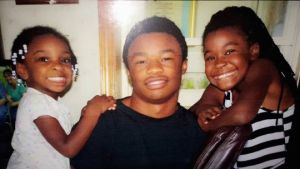The topic of adoption can make an individual feel somewhat misunderstood in the sense that others may view an adopted person’s family as different than theirs, and here, Erin McDermott, a junior double major in early education and special education with a minor in environmental science, feels that people tend to make assumptions without trying to understand that family is family no matter what.
Each month of the year is known for a celebration of awareness. November is dedicated to national adoptive awareness.
This topic can be sensitive to some families. Given, there are approximately 3,000 adoption agencies in the U.S., both private and public, some parents may struggle with the process of adoption.
The art of adopting is not only a way to grow a family but to accept and care for those who may never have forever homes.
You’ve probably heard of open, semi-open and closed adoptions. But these aren’t the only ones. According to the Open Adoption Network, there are also international/domestic, immediate situations, transracial, same-sex, foster care and military adoptions.
Provided the different pathways of adoption, there are stigmas, stereotypes and judgements surrounding the topic. We want to break those negative connotations by advocating and spreading awareness. Credit: Adoption.com
- Adoptive families aren’t ‘real families.’
- Women give away their children.
- Open adoption is bad for the child.
- Adoption is easy.
- Adoption is expensive.
When it comes to educating ourselves regarding this topic, it can be difficult to process. To better understand, it can be described as families we ‘choose.’ Bringing a child into your life can be one of the most rewarding blessings one can experience, especially someone who bounces between foster homes.
Personal reflections
“I think a lot of people believe that being adopted means that your biological parents didn’t want you and that your adopted parents had to form a bond with you that
wasn’t there which is untrue,” McDermott said. “I was fortunate to grow up in a supportive and loving home and sometimes I feel like people don’t realize that just because I’m adopted doesn’t mean I was loved any less.”
By telling her story, she advocates for other adoptees to feel accepted and to know it’s okay that fitting in can be a difficult process when you’re adopted. Not everyone has the same story. McDermott also mentioned how she struggled a lot with fitting in, especially because she grew up in a predominantly white neighborhood. She didn’t grow up as your typical Chinese Asian-American girl. There were points during her childhood where she didn’t want to be part of her culture as it was hard to comprehend what that was.
It’s difficult to keep a connection with your “roots” when you’re not emotionally attached.
“I want other adoptees to know that it’s ok to not feel like you fit in and that it’s ok to be different,” McDermott said. “Looking back I wish I didn’t resist the Chinese culture as much as I did and maintained contact with other adoptees who would’ve understood similar experiences.”

For Seyi Fisher, senior digital communications and social media major, “fitting in is hard.” His outlook is different as he described his experience.
“Some kids really need that change,” Fisher said. “Getting those children help is what’s beautiful about the process itself.” Being an outcast is inside of your own family is an indelible mark that won’t ever fade. There is a huge impact adoption has on children.
“If you’re too young to remember the transition then it’s more subtle in your life,” Fisher said. “Either way fitting in is hard because at a young age you’re forced to adapt to changes that can take an emotional toll on you.” Making friends both inside and outside your family is already difficult. The emotional weight it has on someone who can’t figure out how to fit in is an indescribable feeling.



